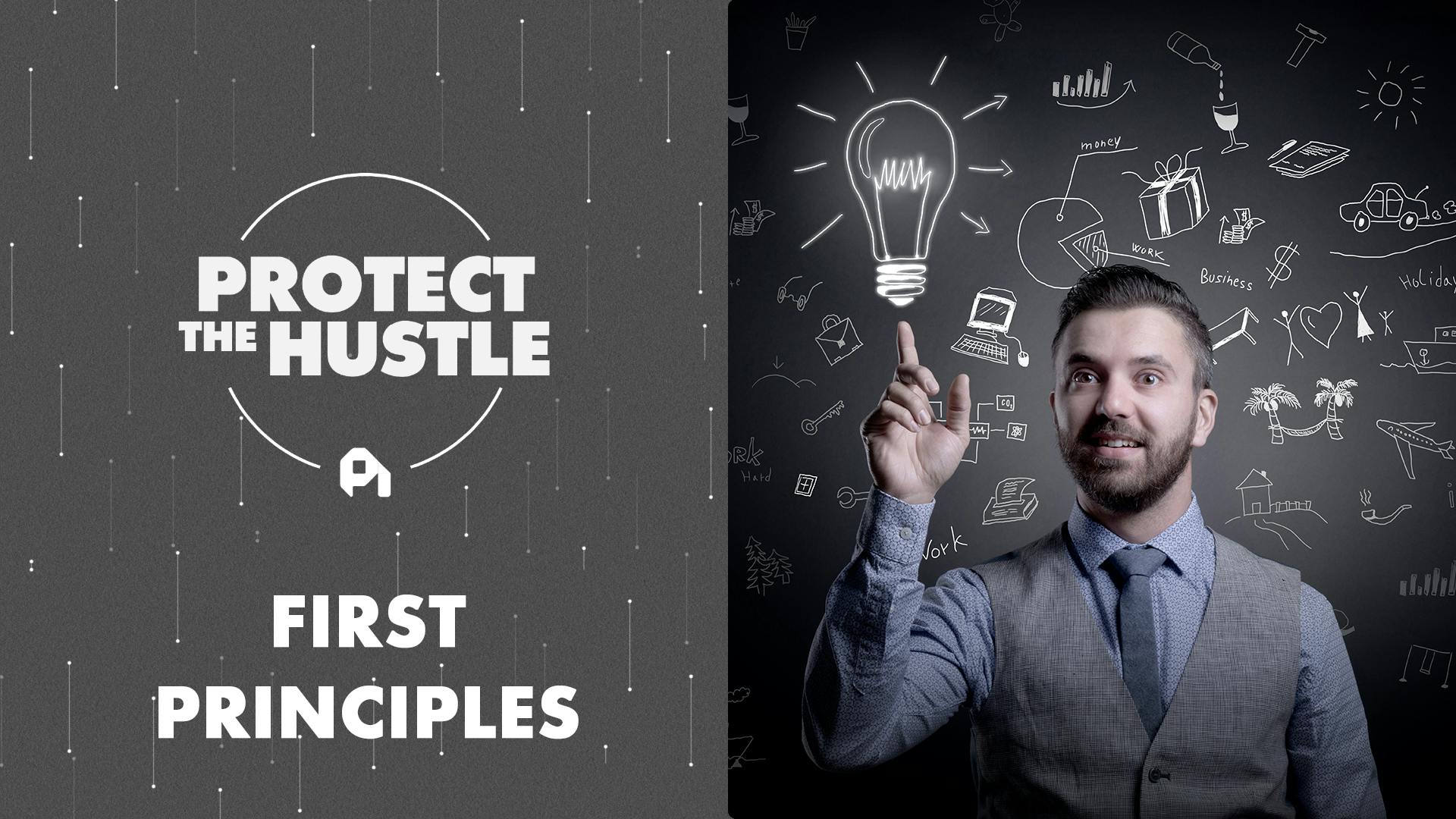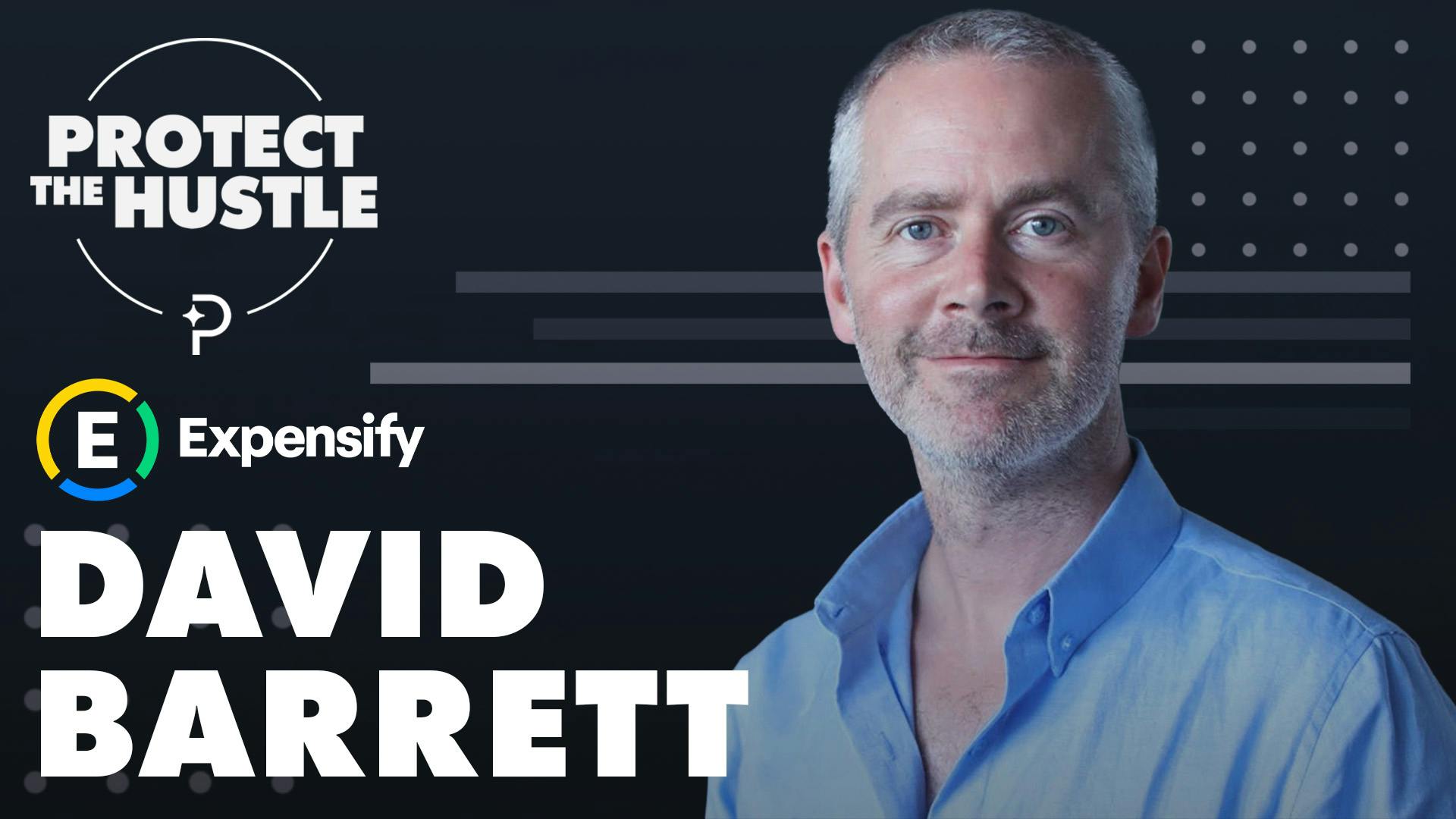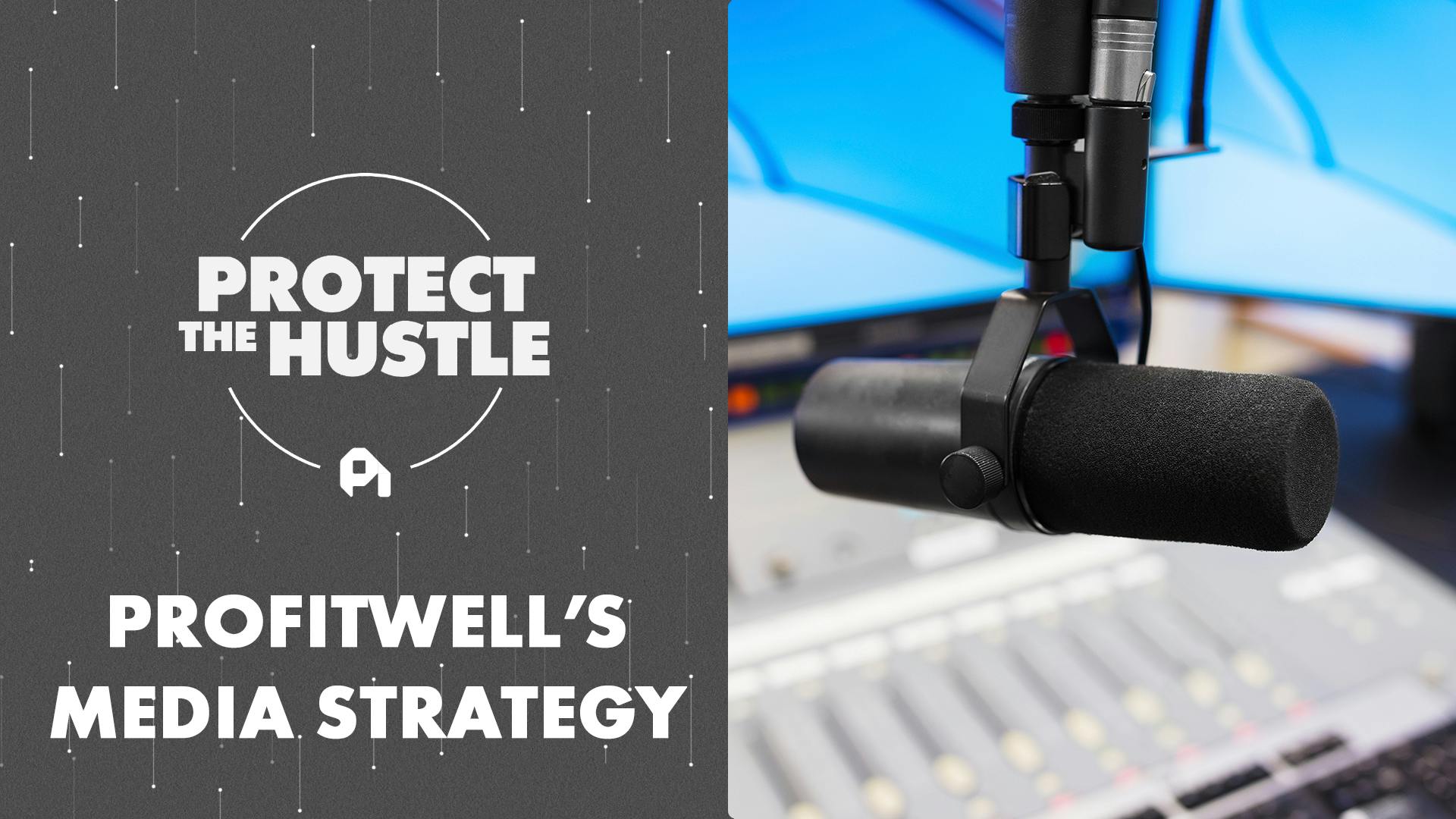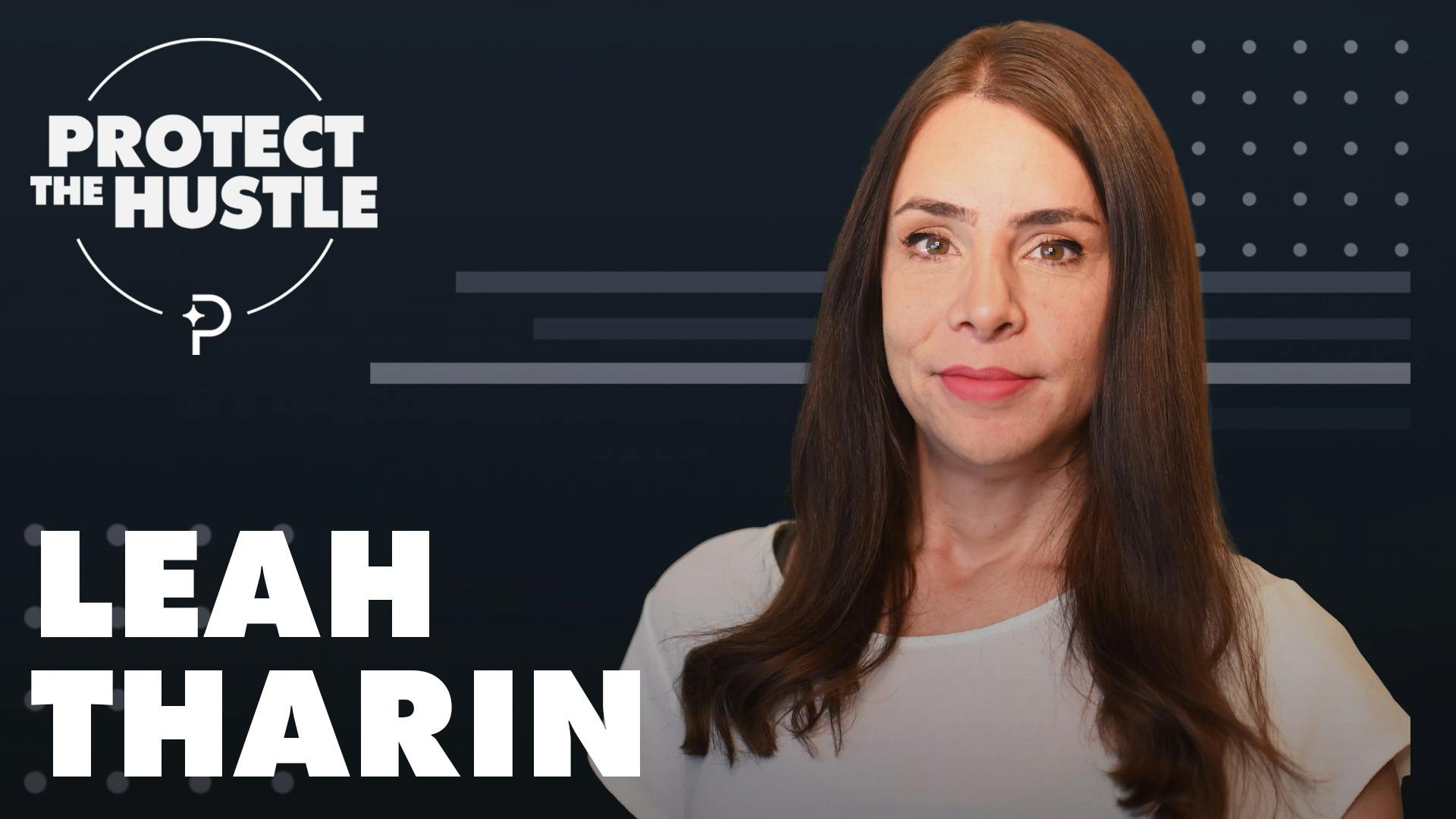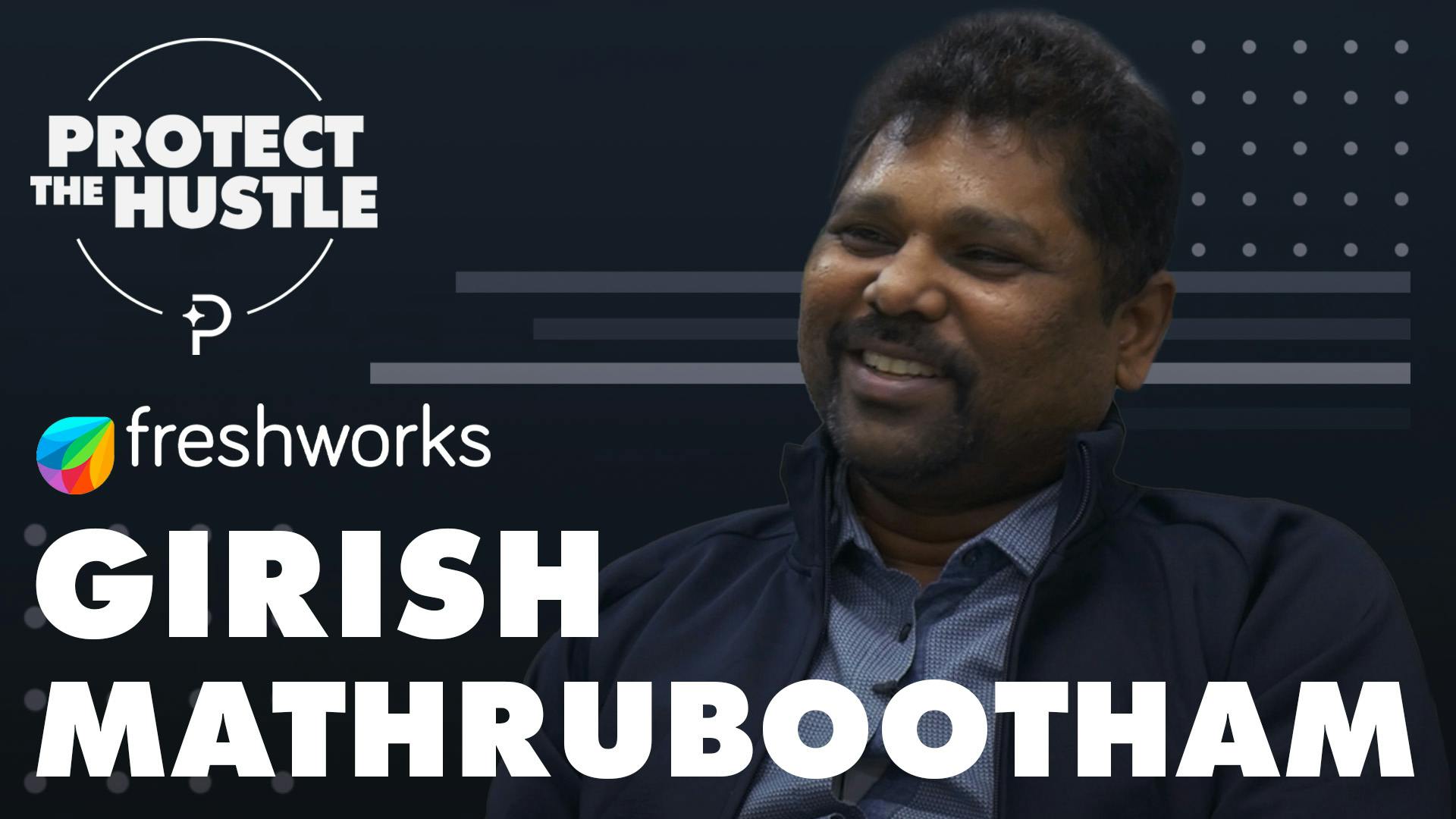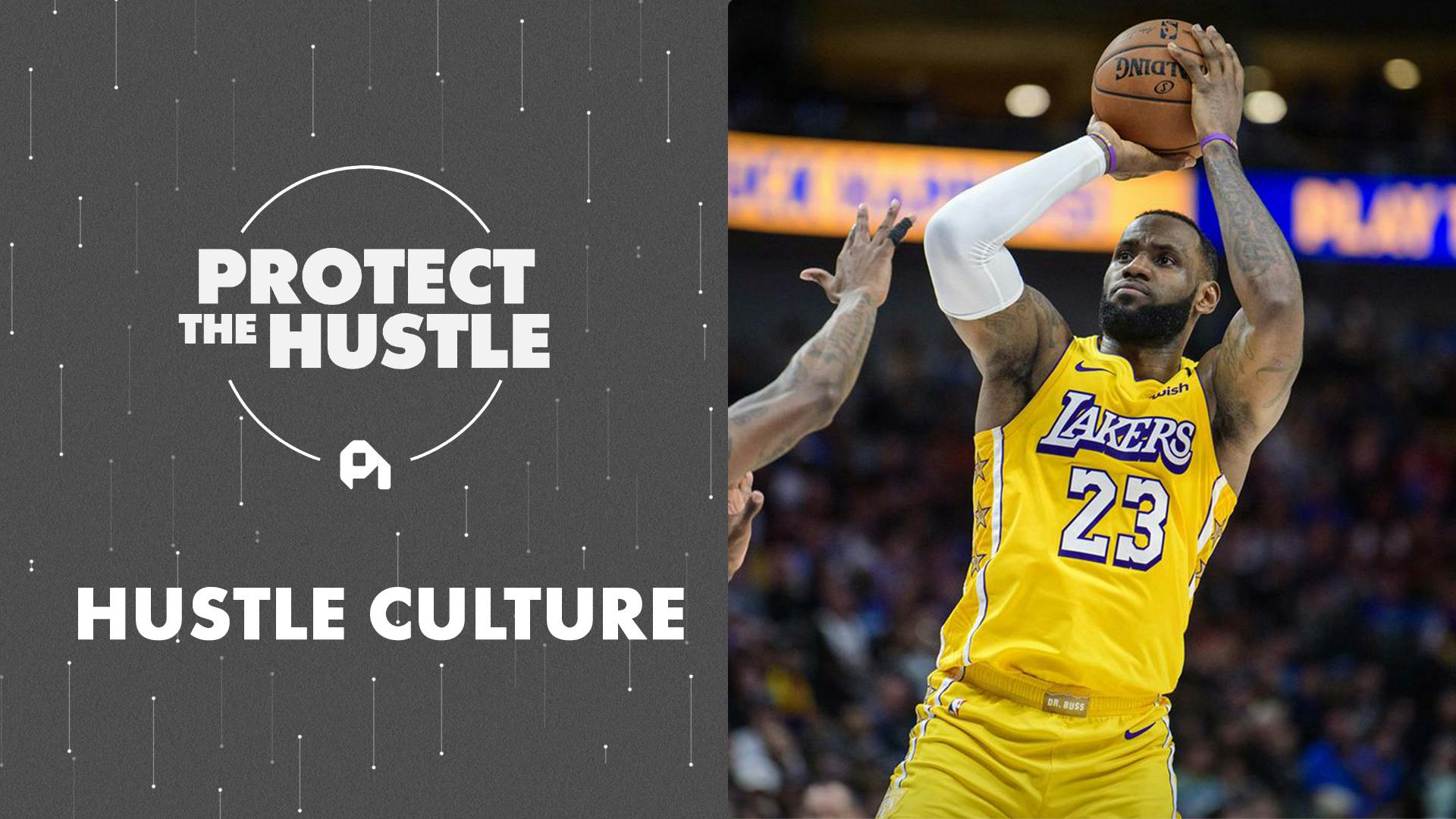
B-Side: Case studies and celebrity impact on retention and pricing
This episode might reference ProfitWell and ProfitWell Recur, which following the acquisition by Paddle is now Paddle Studios. Some information may be out of date.
Please message us at studios@paddle.com if you have any questions or comments!
Influencers and Social Proof
In a world with seemingly infinite options and infinite marketing to show us those options, consumer purchasing behavior has changed dramatically. We've gone from a place of inherently trusting brands by default—after all, why would they lie—to distrusting brands by default. Turns out they lie all the time.
The result? Most marketing has shifted to needing to reinforce trust through free trials, money-back guarantees, and plenty of content. If you can "try before you buy" or at least feel like the brand's spoken to you enough, you'll feel more comfortable making a purchase.
One particular piece of content that's been on the rise are influencer and celebrity endorsements. As media becomes more and more fragmented, we end up trusting individuals over institutions. Let's explore this phenomenon with a bunch of data to answer, should you embark on influencer marketing even in B2B?
Case studies—the original influencers
When we make purchase, we start from a dfplace of dissonance. We may want the product. The product may claim to solve our pain. The product may give us the value we seek. Yet, we don't definitively know, so depending on the price, impact anticipated, and effort required we may end up in analysis paralysis—never making a decision.
Case studies and social proof can help us get over these nerves. After all, if I see a logo of a brand that I think I'm like or a person in a role that's similar to mine, I start to trust that I'm not going to make a mistake. In essence, I see myself in them and they're happy, so I'll be happy, too.
Great in theory, but what's the data show us? I put together a study where I measured willingness to pay without any case studies and then with a similar group measured willingness to pay with different levels of social proof and case studies. The results are below for B2B and DTC, but here's a summary:
- Logo ribbons are basically table stakes at this point and don't influence willingness to pay much. In a previous iteration of this study, they boosted willingness to pay by roughly 5%, now they're essentially at 0%.
- Quotes and case studies increase willingness to pay by 10% or more, which is significant. The higher fidelity the case study—more specific, more complete—the higher the willingness to pay boost in both B2B and in DTC.
2b3c.jpg?auto=compress%2Cformat&fit=max&w=3840)
Pretty fascinating, but let's look at retention now. I looked at a group of users across a bunch of different subscription products and measured if their purchase was influenced by referral, case studies, or any semblance of social proof. I then separated them into two buckets: those influenced and those not influenced, and measured their retention relative to median retention.
The results show that those who came in via social proof retained at a much higher rate than the median, but also those who didn't come through via case studies or social proof retained at a poorer rate that the median.
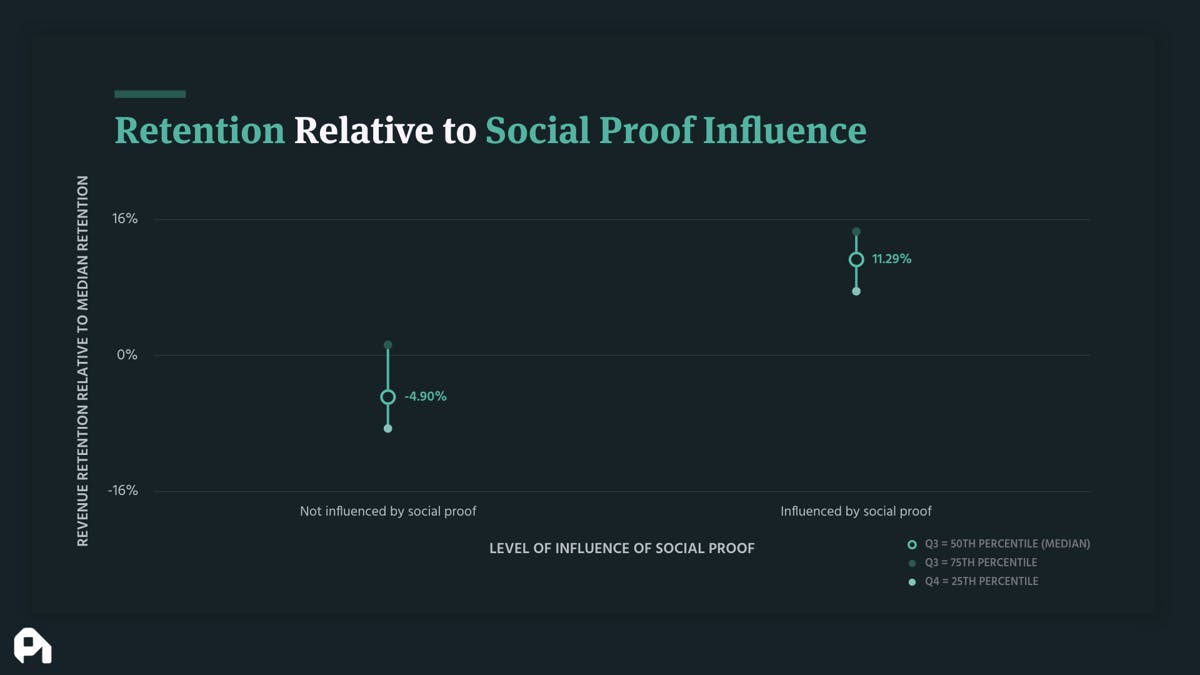
The output here has thrown me for a loop a bit, because you'd think the product would stand alone. After all, if I don't like the product, I'm gone, right? Initially, I thought this data and that thought couldn't live in the same universe. Yet, I think what's happening is the folks who came in influenced by social proof end up giving the product more of a chance. If they aren't getting value, they think they're the problem—"Well Judy at Notion liked the product, I should too; let's try another month." On the flip side, those not influenced by social proof end up being more skeptical. I'll need to noodle on this more, but if you have any ideas reply and let me know.
What should you do with your business?
You need to at least have basic logo ribbons or quotes on your site and in your marketing from existing customers. Invest heavily in case studies that go deep on your product's value and then work to align those case studies to the different leads you have. We personally kicked off a project for written, video, and graphical case studies across our product lines and verticals. You'll start seeing more of that over the next month or so.
Another thought that stemmed from the data here is to include some sort of existing customer marketing of case studies. This may not make sense intuitively, because they're already customers, but based on this data I feel as if creating some sort of FOMO will actually be beneficial to starting the right conversations with your customers.
What about celebrities?
Here's where things get interesting... what happens if I have someone famous or influential (or at least famous/influential for the field I'm in) endorse my product? There are two axes that are interesting when doing celebrity or influencer marketing: One is along their reach for spreading your product, and the other is along the conversion at a particular price point for your product.
For reach, there have been many, many articles written on influencer marketing, so I'm not going to spend a lot of time there. The idea on a basic level though is that your celebrity/influencer has a larger audience of your target customers than you, so presumably, they can spread your product more quickly. This is why we worked to get on Oprah's favorite things when I was at Gemvara, or you can't watch a YouTube video without an ad for a VPN or Honey.
Celebrity/influencer impact on willingness to pay and retention is much more interesting, because, presumably, you have someone more influential than someone similar to you endorsing the product. You have someone you admire or look up to on some level. To measure this we ran the willingness to pay study from above, but used different levels of endorsement. The results are below for B2B and DTC, but here are some interesting takeaways:
- Even if the celebrity or influencer had nothing to do with the product, it still influenced willingness to pay. Put another way, if we had Lindsay Lohan endorse ProfitWell, we'd actually see a bump in conversion and WTP (this endorsement is not in the works FYI).
- When the celebrity/endorsement aligned with the product somehow, the willingness to pay shot up. Bobby Flay endorsing our cookbook has more weight than him endorsing a car.
- Niche influencers have a lot more impact than non-aligned celebrities, even if their audiences aren't as big. This is likely because I trust Jason Lemkin's advice on ProfitWell more than Mike Tyson's.
2b3c.jpg?auto=compress%2Cformat&fit=max&w=3840)
Basically if you can get a celebrity or influencer to endorse your brand, you should, but not before you consider the following retention data. I looked at a number of products that had celebrity or influencer endorsements and connected them with the retention of those companies. Essentially, alignment is crucial here. Those celebrities who were aligned with the product directly had much higher retention than those who didn't. Turns out Lindsay Lohan endorsing ProfitWell isn't that great of an idea. :)
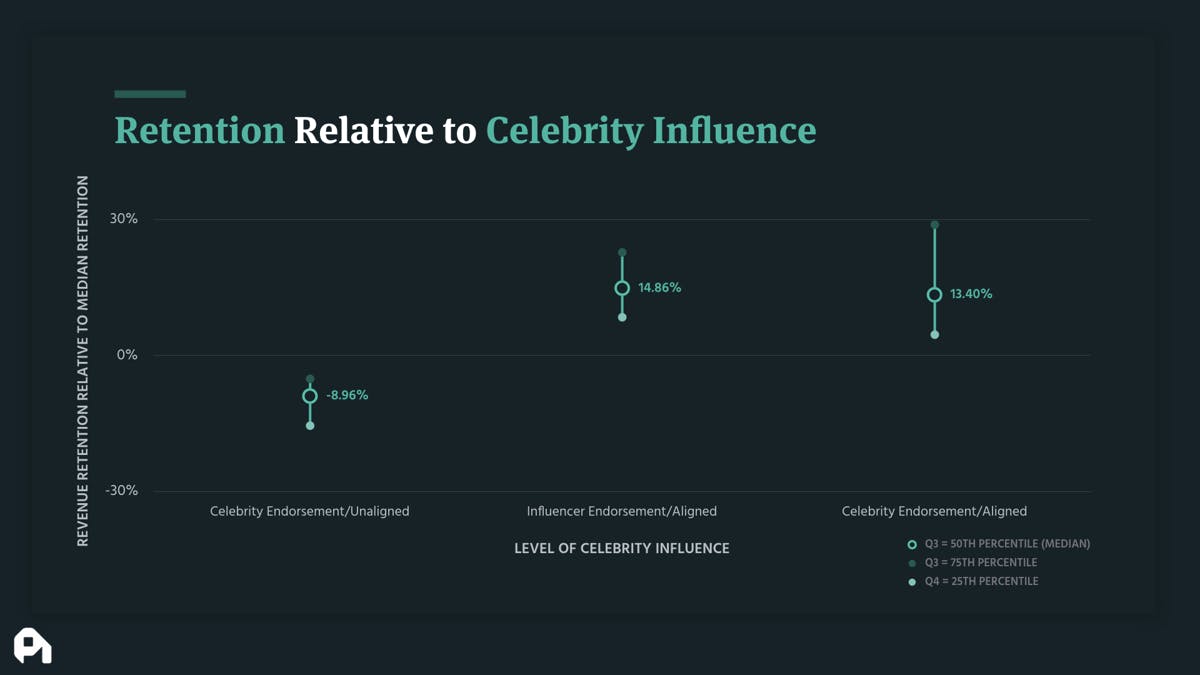
What should you do with your business?
As media becomes more and more fragmented, I think you should absolutely work to have an influencer marketing campaign, even if you're in the world of B2B. Yet, you should realize that this is more than just a spread play—it's a conversion/boost in willingness-to-pay play. As a result, you should work to push your higher-priced product or even do dynamic pricing based on the channel folks come in through.
We're about to do something at ProfitWell along these lines, but it's not quite out yet, so I don't want to go too deep on it. I'll do a fuller write up after we've launched it and have some good data. Just keep in mind, no one is doing anything with influencers in B2B.
BONUS DATA: I'm long on DISCOVERY+
Tangential, but the data above is why I'm long on Discovery+. One thing we learned (and studied) about Disney+ is that while content was everything, the identification with content was even more important. Franchises like Marvel, Star Wars, et al., are why people signed up in droves, not a critically acclaimed documentary. The latter helps, but isn't everything, because while I burn out after five seasons of House of Cards, I somehow never turn off the Food Network.
Discovery+ is the only second-wave streaming service that has this phenomenon. Chip and Joanna Gaines, Oprah, Alton Brown, Guy Fieri, Mike Rowe, and a long list of others give Discovery+ basically Marvel and Star Wars franchises of reality and home television. Here's relative willingness to pay based on whether these celebrities were involved and the respondent was a fan of the celebrity. It's up across the board.
2b3c.jpg?auto=compress%2Cformat&fit=max&w=3840)
The content is also infinitely bingeable. Discovery+ can shoot seasons of Chopped and Good Eats until I die. Fans like me also tend to or are willing to watch other content on Discovery+. Thus, the wheel turns and I'm retained forever. No other streaming service besides Disney+ and Netflix has anything close to this, so I'm excited to see Discovery+ rise through the ranks.
Ok. That's enough analysis for the day. If you found this useful, would love for you to share it on a social media channel of your choice. You can just click one of the buttons below. Ship me feedback or any thoughts by just replying to this email.
Do us a favor?
Part of the way we measure success is by seeing if our content is shareable. If you got value from this episode and write up, we'd appreciate a share on Twitter or LinkedIn.
00;00;00;02 - 00;00;07;10
Patrick Campbell
So basically, Lindsay Lohan endorsing Provo. Well, is actually a really big deal from profit.
00;00;07;10 - 00;00;26;15
Ben Hillman
Well, recur. It's Protect the Hustle where we explore the truth behind the strategy and tactics of B2B SAS growth to make you an outstanding operator. On today's episode, we're talking about case studies and celebrity impact on retention and pricing. Patrick, take it away.
00;00;26;21 - 00;00;48;08
Patrick Campbell
All right, everybody, welcome back to another episode of Protect the Hustle, The B-sides vaults. You're hearing here is Patrick Campbell, CEO and founder of Prof. Well, a couple of housekeeping items before we jump into some really, really cool data, or at least data that I think is pretty cool. For one, we just crossed $13 billion of subscription and annual revenue on profit.
00;00;48;08 - 00;01;08;29
Patrick Campbell
Well, so our benchmarks are now by far the best and most comprehensive on the market. We're pretty excited about this. So excuse the brag and you can sign up for powerful metrics. It's completely free if you want the most accurate, thorough of subscription financial metrics on the market, go out and check those out. Another little bit of a breaker slash request here.
00;01;09;08 - 00;01;30;12
Patrick Campbell
We're hiring across the board. If you are looking or even think you could be looking or know someone who's looking for a gig, I would love to chat to you or them. We have sales product analyst roles, we have ops roles, we have customer success roles. We have everything across the board. We have openings in Boston, Salt Lake City, Rosario and remote.
00;01;30;23 - 00;01;45;21
Patrick Campbell
I will make sure that you are they have a really good experience and I'm also happy to hook you up with a referral bonus as well as if we hire anybody. And then the final housekeeping item here, I'll be in Boston for a bit pretty soon here. So if you're around and you know, obviously want to safely hang out, let me know.
00;01;45;21 - 00;02;06;23
Patrick Campbell
I'm up for walking around the common coffee, brunch, breakfast, whatever. I'll be in town visiting our headquarters there and giving some some more stuff. So with that, let us jump in. And today we are going to be talking about not only things like case studies, but also influencers and celebrity endorsements and particularly their impact on willingness to pay and retention.
00;02;07;04 - 00;02;25;16
Patrick Campbell
And the reason I'm bringing this up and the reason I wanted to talk about this in particular this week is because you're seeing more and more of this fragmentation happening in the world of media. And because of that fragmentation, you're all of a sudden seeing just this rise even more so of not only influencer marketing, but also more endorsements happening.
00;02;25;18 - 00;02;41;25
Patrick Campbell
And because of that, it's, you know, worthy of asking like, is this actually working? Should it work? And ultimately, if it does work, how much does it work? And so we're going to jump into that. And so it's kind of, you know, maybe set the stage a little bit more here. You know, in a world with seemingly infinite options and also infinite marketing.
00;02;41;25 - 00;03;02;18
Patrick Campbell
Right. To show us all of those options, consumer purchasing behavior has changed pretty dramatically. We've gone from this place of inherently trusting brands by default, you know, After all, why would they lie to us to distrusting brands by default? You know, turns out they lie or at least stretch the truth all the time. Now, the result is that most marketing has shifted to needing to reinforce trust.
00;03;02;27 - 00;03;26;11
Patrick Campbell
And the way we do that is a couple of fold. So for one, we have freemium in free trials, we have money back guarantees, we have plenty of content This whole world of instead of pushing things out to people, we now want to pull them to us and make sure that they can either, you know, try before they buy or at least feel like they've spoken with the brand enough to make sure that they're not making a bad purchase, that they're comfortable making that particular purchase.
00;03;26;11 - 00;03;45;01
Patrick Campbell
And one particular kind of piece of content that's been on the rise has already mentioned has been this world of influencer and celebrity endorsements. And we've seen this a lot in the consumer space, but we're seeing it more and more actually happen in B2B as well. And so as I said before, as media continues to fragment, we end up trusting these individuals over institutions.
00;03;45;01 - 00;04;05;09
Patrick Campbell
In essence, these people become their own institutions no matter how small their following might be. And therefore we want to influence essentially our audience based or prospect based through their influence. And so the big answer is, you know, should you embark on influencer marketing or even celebrity type marketing? And so we're going to walk through this in detail.
00;04;05;09 - 00;04;19;21
Patrick Campbell
There's going to be a lot of data. And of course, if you are listening to this and you don't get access to the email, go to protect the hustle dot com to get all the data we're going to reference a little bit easier to view the data than it is to explain the data over audio, but you can also sign up to get the email in your inbox.
00;04;19;21 - 00;04;38;16
Patrick Campbell
You don't even have to leave your inbox once you get that email every single week. So let's first talk about case studies. These are the original influencers. Now when you make a purchase, you start from a place of dissonance, right? You may want the product. The product may claim to solve what your pain is or give you the value that you seek, but we don't definitively know, right?
00;04;38;16 - 00;04;56;21
Patrick Campbell
So depending on the price, the impact anticipated and the effort required, you may end up, you know, in this world of analysis paralysis where you're never going to make a decision. Right. Another way to think about purchasing behavior is to go back to, you know, your chemistry class or even like your seventh grade science class when you learned about kind of activation energy.
00;04;56;21 - 00;05;14;08
Patrick Campbell
Right? So for some sort of reaction to take place, it needs to get over, you know, the threshold of activation and energy. And if the activation energy is like eight out of ten, you know, there's different things you can add like a catalyst in order to get that activation energy to the point that the actual reaction will take place.
00;05;14;17 - 00;05;41;09
Patrick Campbell
And in kind of a sales sense, these can be things like the tribe before you buy. They can be things like the content or they can be like these influencers or these endorsements, know case studies and social proof can help kind of calm these nerves and all of a sudden make that purchasing decision actually much easier. After all, like if you see a logo of a brand that you think that you're like or a person in a role that similar to yours, you start to trust that you're not going to make a mistake.
00;05;41;09 - 00;06;03;00
Patrick Campbell
In essence, you see yourself in them and they're happy. Therefore, you should be happy too. Now, this is great in theory, but you know, again, what does the data show us? So I put together a study where I measured willingness to pay without any case studies or social proof. And then I asked a similar group of people, basically their willingness to pay based on different levels of social proof for the same types of products.
00;06;03;00 - 00;06;22;24
Patrick Campbell
Now, the result I have for both B2B and in DTC, but basically, here's the summary In the world of B2B logo ribbons or even in DTC, this whole concept of logo ribbons, which would just be like, you know, reviews essentially they're basically table stakes at this point. They don't influence willingness to pay much at all. And in a previous iteration of the study, we ran it a couple of years ago.
00;06;23;05 - 00;06;45;26
Patrick Campbell
These things did boost willingness to pay by roughly about 5%, and now they're essentially at zero. Now, what's also interesting are things like quotes and case studies tend to increase willingness to pay by about 10% or more, which is pretty significant. And if I pull up the data now to kind of talk you through it a little bit, what we did in both DTC and in B2B is we had just a simple testimonial quote.
00;06;45;26 - 00;07;01;16
Patrick Campbell
We had a mini case study which would kind of be a little bit more than a quote, but not quite an entire landing page or a video. And then we had kind of a full case study. And I'm going to talk about the medians, meaning the boost in willingness to pay basically a testimonial, quote, boosted willingness to pay by about 10%.
00;07;01;16 - 00;07;27;03
Patrick Campbell
A mini case study, increased willingness to pay by about 15%, and then a full case study increase by 20 to 25%. So essentially, these types of case studies, again, we're kind of showing we're supporting data here that essentially, if you include these types of things, those viewers, especially those who are particularly influenced by this kind of social proof, are actually willing to pay more, which thereby will also affect your conversion rates as well.
00;07;27;16 - 00;07;50;20
Patrick Campbell
Now, this is also really, really fascinating when we start to look at retention. So what I did here is I looked at a group of users across a bunch of different subscription products, and I measured that if their purchase was influenced by a referral, a case study or any semblance of social proof, I then separated them into two buckets those who were influenced and those who were not influenced and basically measured their retention relative to median retention.
00;07;50;21 - 00;08;10;04
Patrick Campbell
Now, the results basically showed that those who came in via social proof were retained a much higher rate than those who weren't. And not only were they better at retaining than those who weren't, those who were not influenced by social proof actually had worse retention than the overall median. To give you some numbers here, basically, those folks were not influenced by social proof.
00;08;10;13 - 00;08;28;26
Patrick Campbell
They essentially had 5% on a relative basis, less revenue retention. And those who were influenced by social proof essentially had about 10% plus better retention. Now, this output basically threw me for a loop a little bit because you would think that the product would stand alone. After all, if I don't like the product, I'm going to leave, Right?
00;08;29;03 - 00;08;52;14
Patrick Campbell
Even if I came in with some sort of, you know, celebrity endorsement or some sort of case study. Right. Well, initially, like, you know, I basically thought that that concept of the product is so important and the social proof kind of couldn't live in the same universe. But I think what's happening here is that the folks who came in influenced by social proof, end up giving the product more of a chance if they aren't getting value, they think that there's this problem.
00;08;52;14 - 00;09;16;23
Patrick Campbell
Well, you know, Judy, at Notion really liked the product. I should, too. Let's try another month. And on the flip side, those not influenced by social proof end up being more skeptical. And I'm going to need to noodle on this a little bit more. But this kind of explains some of the phenomenon that we typically see, which is, you know, why is everyone loving this product that objectively is worse than this other product, while oftentimes it's because there's a little bit of a critical mass kind of phenomenon that's happening.
00;09;16;24 - 00;09;33;26
Patrick Campbell
And so before we get into the celebrity side, you know, what should we do with this? Well, you need to at least have basic logo ribbons or quotes on your site and in your marketing for your existing customers. You got to invest heavily in case studies that go deep on your products value and the work to align those case studies, the different leads that you have and proffer.
00;09;33;26 - 00;09;58;24
Patrick Campbell
Well, you know, especially in the context of this data, we personally have kicked off a pretty big project around written video and even kind of graphical case studies across our product lines and verticals. And you're going to start seeing more of that from us in the future. But I think the big thing here to kind of think about to put this in a different context is if your product is so similar to the market or even if it's not that similar, if it's not ten X, then it's really hard to find a space right now where you can build a ten X product.
00;09;59;12 - 00;10;18;00
Patrick Campbell
You're just better off basically putting together some sort of, you know, kind of social proof blitz, because ultimately that's why people are going to come to you, because they're going to think that there's some other, you know, fairy dust on your product. Now you have to back that up with your product. But ultimately, if your products are great, you got to make sure that you're bringing in those right type of people.
00;10;18;00 - 00;10;43;01
Patrick Campbell
And there's no better way than bringing in that social proof. Now, another thought that kind of stems from this is to include some of your existing customer marketing. These case studies, meaning, you know, showing these existing case studies to your existing customer base. Now, this didn't really intuitively make sense at first because, you know, they're already customers. But based on this data, I feel like you can create some sort of FOMO that will actually be beneficial to start the right conversations with your customers.
00;10;43;01 - 00;10;59;00
Patrick Campbell
So put another way, you know, sending a case study to someone who maybe isn't as a retained customers, they should be or their engagement isn't as good, kind of reminds them of, Oh, this person's getting this out of the product, maybe I should get this out of the product as well. So let's move on to talk about celebrities for a second.
00;10;59;07 - 00;11;25;00
Patrick Campbell
So this is where things get interesting. Basically, what we want to look at is what happens if I have someone famous or influential or at least famous or influential for the field that I'm in endorse my product. Is this a smart move? You see this a lot of times. In fact, there's companies that their entire strategy is wrapped around essentially, you know, launching brands off the names of celebrities and having some sort of relationship with that particular celebrity.
00;11;25;10 - 00;11;43;04
Patrick Campbell
What does it do? And there's two axes that are interesting here where an influencer or a celebrity can actually influence. One is just the spread of the product, and then the other is obviously in the conversion and the price point, which we'll be looking at from a case study perspective. Now for REACH, there have been many, many articles written on influencer marketing, so I'm not going to spend too much time there.
00;11;43;04 - 00;12;00;22
Patrick Campbell
But this is new to you. The idea on a basic level is that your celebrity or influencer has a larger audience of your target customer than you, so presumably they could spread your product more quickly. This is why when you know my first startup job was a company called Bar that made customizable jewelry, we were always trying to get on Oprah.
00;12;00;22 - 00;12;25;07
Patrick Campbell
And this is also why when you watch a YouTube video, you're getting ads for VPNs or Honey or, you know, Seatgeek when you know, events were happening previously. Now, what's more interesting and what we're going to explore here with some actual data is that celebrity and influencer impact on willingness to pay in retention is much, much more interesting because presumably you have someone more influential than someone similar to you endorsing the product.
00;12;25;20 - 00;12;49;08
Patrick Campbell
So what I mean by that is you have someone you admire or you looked up to on some level that's influencing the product and that therefore is influencing your purchasing decision. So in some cases, that's Ryan Reynolds with Mint Mobile basically saying he owns Mint mobile. Right. And it's amazing. Right? And therefore you should buy it. And then on the other hand, you have someone like Rachel Ray, you know, kind of a famous chef basically saying this is the Rachel Ray line of products.
00;12;49;08 - 00;13;08;11
Patrick Campbell
If you want to cook like me, make sure that, you know, you buy my products, my cookbooks, my cookware, these types of things. Now, to measure this, we ran the willingness to pay study from above that we already kind of talked about, but we use different levels of endorsement. The results are below or I'm going to describe them right now from A, B to B and DDC and go to protect the hustle dot com to actually get the data.
00;13;08;11 - 00;13;27;14
Patrick Campbell
But here's some really interesting takeaways. So even if the celebrity or influencer had nothing to do with the product, it still influence willingness to pay. Put another way, if you have Lindsay Lohan or Ryan Reynolds endorse Provo, well, we would actually see a bump in conversion and willingness to pay. And neither of those endorsements are in the works, just so you know.
00;13;27;14 - 00;14;04;10
Patrick Campbell
But if you know Lindsay Lohan or Ryan Reynolds and they think they'd be willing to endorse a subscription, financial metrics suite of products, let me know. Is that the big thing here is that when the celebrity or endorsement aligned with the product, somehow the willingness to pay shot up. So what I mean by that is, you know, Bobby Flay, for instance, all I can think of or cooking people and actors clearly within this particular post or file here, but when Bobby Flay endorses a cookbook that has more weight than if Bobby Flay was endorsing a car, and then niche influencers have a lot more impact than nonaligned celebrities, even if their audiences aren't that big.
00;14;04;13 - 00;14;27;09
Patrick Campbell
So this is likely because, you know you're going to trust Jason Lemkin saying something about profit. Well, more so than Mike Tyson. So to kind of go through this data and a little bit more detail, basically a celebrity endorsement that's unaligned, you're actually going to typically see in the world of consumer, you're going to see about a 10% boost in willingness to pay an influencer endorsement that's aligned.
00;14;27;09 - 00;14;45;00
Patrick Campbell
You're going to see about a 20% boost in willingness to pay. And then a celebrity endorsement that's aligned. This is like Bobby Flay in his cookbook. You're typically going to see about 23% boost in willingness to pay. And in the world of B2B, it's almost exactly the same celebrity endorsement that's on a line. This is the Lindsay Lohan example about profit.
00;14;45;00 - 00;15;05;20
Patrick Campbell
Well, about 8% influencer endorsement. That's a line this would be like Jason Lemkin, 23% boost in willingness to pay and then celebrity endorsement aligned. This is as if, you know, Ryan Reynolds actually was an owner of Mint Mobile and also created some sort of new technology in the telephony space because he was so smart. That's about 24% here.
00;15;05;20 - 00;15;25;17
Patrick Campbell
So, long story short, the better thing to do is make sure you have someone aligned somehow and also influencers who tend to be a little bit cheaper than an actual celebrity. And there's a line where, you know, influencer crosses into celebrities. So any Kardashian or Jenner that would endorse your product, there probably would be, you know, much, much better, you know, lift.
00;15;25;24 - 00;15;43;21
Patrick Campbell
But if you can't find those and you have somehow an end to a celebrity that's not aligned to your product, go for it. Actually, this kind of brings me back to the Gary Busey ads that Grasshopper did a long time ago, you know, in that whole ad campaign that they did. And if you want to laugh, just look up, you know, YouTube, Gary Busey, grasshopper.
00;15;43;21 - 00;15;59;09
Patrick Campbell
I think they're pretty funny ads. But the basic idea is like basically if you can get a celebrity or influential to endorse your brand, you should, but not before you consider, you know, all the data here because there's some interesting retention data. So I looked at the number of products that had celebrity influencer endorsements, and admittedly it wasn't a ton.
00;15;59;09 - 00;16;20;16
Patrick Campbell
So this is a limited sample set and basically connected to the retention of those particular companies. Essentially, alignment is so, so crucial because those celebrities who are aligned with the product directly had much higher retention. So to give you some data here, basically the celebrity endorsements that were on aligned, the retention tended to be 10% less than the median to those customers who were coming through.
00;16;20;16 - 00;16;47;04
Patrick Campbell
For Lindsay Lohan endorsing profit, well, their retention engagement would be about 10% less, whereas the influencer endorsement that's aligned, Jason Lampkin talking about all that typically had a 15% higher retention. And then celebrity endorsement that was aligned had about typically 13% higher retention. So you're looking at a world where it's always better to be aligned. But there's still some things, especially if you're in the world of DTC, that you might want to use if you're not necessarily caring too much about retention.
00;16;47;04 - 00;17;01;17
Patrick Campbell
And I know everyone says they care about retention, but you know, their activities don't always follow it. So what should you do as a business here? Let's break this down. You know, as media becomes more and more fragmented, I think you absolutely need to work to have an influencer marketing campaign. Even if you're in the world of B2B.
00;17;01;28 - 00;17;19;11
Patrick Campbell
You should realize, though, that it's more than just a spread play. It is about that conversion, it is about that willingness to pay. And as a result, you probably want to make sure that you're pushing your higher priced product through these channels or even do some sort of dynamic pricing on the channel folks that come through on. We're about to do something like this at profit.
00;17;19;11 - 00;17;34;25
Patrick Campbell
Well, it's not quite out yet and I don't want someone else to jump on it, so I'm not going to go deep into it, but I'll do a full write up after we've launched it and have some good data. So just keep in mind that no one is doing this really in B2B and we're hoping to be kind of the one of the first to do this in B2B.
00;17;35;06 - 00;17;57;26
Patrick Campbell
Now with that, there's one other thought that I had this week, and so if you allow me to kind of go off on a tangent here and that really is around Discovery, plus the new kind of streaming service from Discovery, it kind of combines the Food Network, Discovery Channel and a bunch of other fun channels. So where this is starting from is, you know, I was thinking about influencers, I was thinking about their impact kind of on retention and willingness to pay.
00;17;57;26 - 00;18;18;11
Patrick Campbell
And basically I am long on Discovery. Plus I think Discovery Plus is probably going to be I don't think it's going to be Netflix. It's probably not going to be Disney Plus, but it is going to be the winner of that second tier. And I think that what I'm so fascinated by is that discovery plus basically has everything that we just talked about in spades.
00;18;18;26 - 00;18;34;20
Patrick Campbell
What I mean by that is, you know, one thing that we kind of learned and studied about Disney Plus is that while content is everything when it comes to streaming networks, the ID shown with content was even more important. What I mean by that is that franchises like Marvel Star Wars at all are why people signed up in droves.
00;18;34;20 - 00;19;01;05
Patrick Campbell
It's not a critically acclaimed documentary. I might go to network because of a really cool documentary. I might go there because a House of Cards, which was the really big first hit there. But the problem is that documentaries and things like House of Cards, they help, but they're not everything because I'm going to burn out after five seasons of House of Cards, but I'm not necessarily going to turn off ever something like the Food Network and Discovery Plus is the only second wave streaming service that has this phenomenon.
00;19;01;13 - 00;19;20;06
Patrick Campbell
You have Chip and Joanna Gaines, you have Oprah, you have Alton Brown, you have Guy Fieri of Micro and just a long list of others that give discovery plus basically Marvel and Star Wars franchises, but on a reality and home television level. And I think what's really fascinating about this is that it's a long tail. It's not as expensive.
00;19;20;14 - 00;19;51;11
Patrick Campbell
You might not know of any of those people that I just mentioned, probably, you know, Oprah, but I will tell you that there are huge fan bases, not Star Wars level, but very, very large fan bases for every single one of those people or the couple of Chip and Joanna Gaines that I mentioned. And what's really, really fascinating is that that amount of people not only brings in people from a retention perspective, but also boost that willingness to pay and so I looked at willingness to pay basically these celebrities or these influencers, depending on how you want to define celebrity.
00;19;51;20 - 00;20;13;14
Patrick Campbell
And basically it's just up across the board. So, for instance, Guy Fieri boosted willingness to pay for something like Discovery plus by about 10%, Alton Brown 12%, Micro, 12%. Chip and Joanna Gaines about 18%. They were going to form a Magnolia network. And basically Discovery plus, I'm pretty sure came in and was just like, Nope, we're going to basically buy this up and form it into discovery Plus.
00;20;13;27 - 00;20;36;08
Patrick Campbell
And they're seeing a scenario where they're essentially combining everything into one, which is really, really amazing because the content, if you've ever had, you know, Chopped and the Food Network on in a hotel room, you end up watching six episodes because it's so bingeable it's so, so Bingeable and Discovery plus can basically shoot these types of shows until I die.
00;20;36;09 - 00;20;53;19
Patrick Campbell
Like they don't need to have like $10 million per episode and, you know, crazy amount. It's the reality and hope television that basically is the stuff you put on the background or the stuff that you watch while you're checking email and these types of things and your fans like me, you know, we also tend to or are willing to, you know, watch other content and discovery.
00;20;53;19 - 00;21;08;28
Patrick Campbell
Plus I don't know everything on there, but if I'm watching, you know, something from the Food Network, all of a sudden I'm going to go, Oh, this is interesting. Let's watch something else. And the wheel basically returns and you're retained forever. So I think Discovery Plus is going to end up having some of the best retention out there.
00;21;09;09 - 00;21;27;00
Patrick Campbell
And no other streaming service, not a single one besides Disney Plus and Netflix has anything close to what Discovery Plus has. So I'm really, really excited to see this because I don't think like Paramount Plus and like James Corden and, you know, maybe some sports that they're not going be able to have everything, but like Paramount Plus is going to have it.
00;21;27;11 - 00;21;42;16
Patrick Campbell
And so I think you're going to see, you know, the combination of so many niches with Discovery Plus is going to be so powerful so that you to all find that interesting. I think that there's some good takeaways for your business just in terms of like bringing people in. But we can save this for another day. And I think that's enough analysis for the day.
00;21;42;16 - 00;21;57;15
Patrick Campbell
So if you found this useful, would love for you to share it on a social media channel of your choice. If you're in the email, we've got some social share buttons all primed up for you at the bottom of the email, or you can just take the link and basically copy and paste it into wherever you're going. If you got any feedback or thoughts, obviously ship me an email back.
00;21;57;15 - 00;22;06;26
Patrick Campbell
But with that, have a good rest of your week, have a good weekend and we will chat next week. We'll see.
00;22;06;26 - 00;22;47;15
Ben Hillman
Thanks for listening. If you enjoyed this episode, we'd really appreciate it if you left a five star review of this podcast or you equivalent rating wherever you listen or watch. Also make sure you subscribe to and tell your friends about Protect the Hustle, a podcast from Al Roker, the largest, fastest growing media network dedicated to the world of subscriptions.
